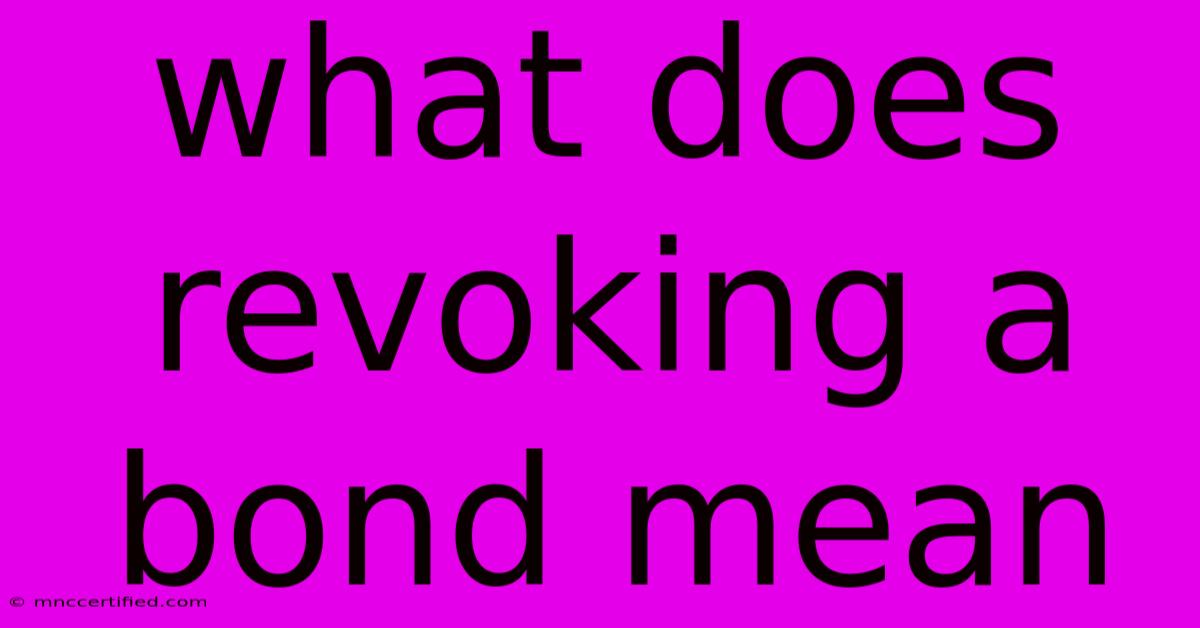What Does Revoking A Bond Mean

Table of Contents
What Does Revoking a Bond Mean? A Comprehensive Guide
Understanding the implications of revoking a bond is crucial for anyone involved in surety arrangements, whether as a principal, surety, or obligee. This comprehensive guide breaks down the meaning of bond revocation, its process, and the consequences it entails.
What is a Bond?
Before diving into revocation, let's clarify what a bond is. A bond is a legally binding agreement between three parties:
- Principal: The individual or entity obligated to fulfill a specific duty or obligation.
- Surety: The party guaranteeing the principal's performance. They agree to pay a specified sum if the principal defaults.
- Obligee: The party receiving the protection offered by the bond. They are the beneficiary if the principal fails to meet their obligations.
Bonds are used in various situations, including:
- Fidelity Bonds: Protect against employee dishonesty.
- Contract Bonds: Ensure contractors complete projects according to specifications.
- Court Bonds: Secure the appearance of a defendant or the payment of a judgment.
- License and Permit Bonds: Guarantee compliance with regulations.
What Does Revoking a Bond Mean?
Revoking a bond means terminating the surety's obligation to guarantee the principal's performance. This action officially releases the surety from their responsibility to pay if the principal defaults after the revocation date. It's important to note that revocation does not automatically erase past obligations. If the principal defaulted before the revocation, the surety remains liable for those breaches.
Who Can Revoke a Bond?
The ability to revoke a bond depends on the specific terms of the bond agreement and applicable laws. Generally, only the surety can initiate the revocation process. However, the obligee may have the right to challenge the revocation if it's deemed improper or violates the agreement's terms.
How is a Bond Revoked?
The process of revoking a bond usually involves:
-
Formal Notice: The surety must provide formal written notice to both the principal and the obligee. This notice typically specifies the date of revocation and the reasons for the action. This is a critical step; failing to provide proper notice can result in the surety remaining liable.
-
Compliance with Legal Requirements: Specific legal requirements might govern bond revocation depending on the jurisdiction and type of bond. These requirements could include filing paperwork with a government agency or court.
-
Potential for Dispute: The obligee may dispute the revocation if they believe it is invalid or unfair. This could lead to legal proceedings.
Consequences of Bond Revocation
Revoking a bond has significant ramifications for all parties involved:
-
Principal: The principal loses the surety's guarantee of performance. They are now solely responsible for fulfilling their obligations. This can severely impact their credibility and future projects.
-
Surety: The surety is relieved of future liability for the principal's performance. However, they are still liable for any breaches that occurred before the revocation date.
-
Obligee: The obligee loses the protection provided by the surety's guarantee. They are now at greater risk of financial loss if the principal defaults. They may need to pursue legal action against the principal to recover damages.
Finding a Surety Bond
Choosing the right surety bond is a critical step. Research reputable surety companies with a proven track record. Consider factors such as:
- Financial Strength: Ensure the surety company has the capacity to meet their obligations.
- Industry Expertise: Select a surety company with experience in your specific industry.
- Customer Service: Choose a company known for its responsive and helpful customer service.
Conclusion: Understanding the Nuances of Bond Revocation
Revoking a bond is a complex legal process with far-reaching consequences. Thorough understanding of the bond agreement's terms and applicable laws is essential for all parties involved. Seeking professional legal advice is highly recommended before initiating or responding to a bond revocation. Proper understanding of this process can mitigate potential risks and ensure compliance with legal requirements. Remember, the information provided here is for general knowledge and should not be considered legal advice. Always consult with legal professionals for specific guidance.

Thank you for visiting our website wich cover about What Does Revoking A Bond Mean. We hope the information provided has been useful to you. Feel free to contact us if you have any questions or need further assistance. See you next time and dont miss to bookmark.
Featured Posts
-
Is Composite Bonding Permanent
Nov 26, 2024
-
Sean Connery Tuxedo James Bond
Nov 26, 2024
-
Drake Accuses Spotify And Umg Inflated Streams
Nov 26, 2024
-
Guardian Insurance St Thomas Vi
Nov 26, 2024
-
Louisiana Bail Bond Calculator
Nov 26, 2024